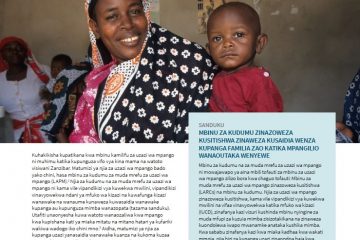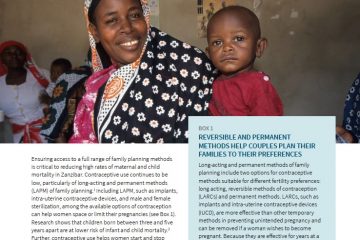Quick Links

Zanzibar Needs Broader Access to Long-Acting and Permanent Methods of Family Planning
Contraceptive use in Zanzibar continues to be low, particularly of long-acting and permanent methods (LAPM) of family planning. LAPM includes reversible methods like implants and intra-uterine contraceptive devices as well as permanent methods like vasectomy and tubal ligation. The percentage of women who don’t want future pregnancies but aren’t currently using any form of contraception is higher across all regions of Zanzibar (expect for Kusini Unguja) than the national average. LAPM can be a desirable method for women and couples who have reached their preferred family size and want no future pregnancies and for women for whom future pregnancies are not advised for health reasons.
PRB partnered with Zanzibar Nurses Association (ZANA) to create a policy brief that highlights barriers to provision of LAPM and recommends concrete actions the Ministry of Health Zanzibar (MOHZ) can take to improve access to family planning, support a healthy population, and achieve its development goals. The brief features data ZANA collected and analyzed from nine hospitals and 20 primary health facilities across five regions of Zanzibar, revealing that hospitals experience LAPM equipment shortages and offer limited family planning services, and that less than half of facility providers have received training in key family planning skills. Recommended actions for MOHZ emphasize ensuring all hospitals have adequate supplies and equipment for provision of LAPM, health care providers are adequately trained on LAPM and have job aids to assist them in providing care, and community health volunteers have adequate capacity to mobilize and educate the public on LAPM and make effective referrals. The policy brief is available in English and Kiswahili.


